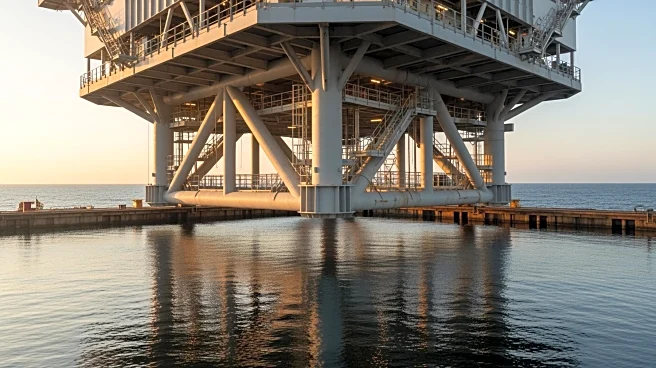What's Happening?
Drydocks World has successfully converted a double-hulled tanker into a Floating Production Storage and Offloading (FPSO) unit, named EMEM, for deployment at Nigeria's Okwok field. The conversion included structural modifications, marine system upgrades,
and the installation of 19 topside production and utility modules at Drydocks World's Dubai facility. Commissioned by World Carrier Corporation on behalf of Oriental Energy Resources, the FPSO is designed to process up to 70,000 barrels of liquids per day, handle 15 million standard cubic feet of gas daily, and store up to one million barrels of crude. The vessel is expected to begin production in the first quarter of 2026 and operate for up to 15 years without drydocking.
Why It's Important?
The deployment of the EMEM FPSO is significant for Nigeria's oil production capabilities, particularly at a time when the country is aiming to increase its output. The FPSO will contribute to Nigeria's 'One Million Barrels' project, enhancing the nation's energy infrastructure and production capacity. This development underscores the strategic importance of offshore engineering services provided by Drydocks World, a DP World company, which has a track record of delivering over 30 FPSO conversions. The project also highlights the collaboration between international and local entities in advancing Nigeria's energy sector.
What's Next?
The EMEM FPSO is set to begin operations in early 2026, marking a critical step in Nigeria's efforts to boost oil production. The Nigerian Upstream Petroleum Regulatory Commission (NUPRC) has expressed support for Oriental Energy Resources, indicating ongoing regulatory backing for the project. As the FPSO becomes operational, it will likely attract further investments and partnerships in Nigeria's offshore oil sector, potentially leading to increased economic activity and job creation in the region.
Beyond the Headlines
The conversion and deployment of the EMEM FPSO reflect broader trends in the global energy industry, where offshore production is increasingly vital. This project may influence future investments in similar offshore developments, particularly in regions with untapped oil reserves. Additionally, the technological advancements and engineering expertise demonstrated in this conversion could set new standards for efficiency and sustainability in offshore oil production.














